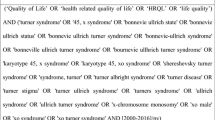Abstract
The aim of treatment of hypopituitary children is the achievement of final adult height as near to normal ranges as possible, correct signs and symptoms due to other hormone deficiencies, and increase the sense of well-being. In this way, a satisfactory physical, psychological, and social adjustment is anticipated. A good physical outcome has been reported by many authors, but poor psychosocial adaptation is not yet resolved. The aim of this study was to evaluate the degree of social integration of a group of adult hypopituitary patients diagnosed and treated during childhood by analyzing educational achievement, employment, and personal adjustment (1–3).
Access this chapter
Tax calculation will be finalised at checkout
Purchases are for personal use only
Preview
Unable to display preview. Download preview PDF.
Similar content being viewed by others
References
Dean H, McTaggart T, Fish D, Friesen H. Long-term social follow-up of growth hormone deficient adults treated with growth hormone during childhood. In: Stabler B, Underwood L, eds. Slow grows the child: psychosocial aspects of growth delay. Hillsdale, NJ: Lawrence Erlbaum Associates, 1986: 73–82.
Clopper R, MacGillivray M, Mazur T, Voorhess M, Mills B. Post-treatment follow-up of growth hormone deficient patients: psychosocial status. In: Stabler B, Underwood L, eds. Slow grows the child: psychosocial aspects of growth delay. Hillsdale, NJ: Lawrence Erlbaum Associates, 1986: 83–96.
Meyer-Bahlburg HF. Short stature: psychosocial issues. In: Fima Lifshitz, ed. Pe-diatric endocrinology: a clinical guide, 2nd ed. New York: M. Dekker, 1990: 173–96.
Beck AT, Ward CH, Mendelson M, Mock J, Erbaugh J. An inventory for measuring depression. Arch Gen Psych, 1961; 4: 561–71.
Instituto Nacional de Estadísticas y Censos, INDEC, Repüblica Argentina. Situatión y Evolución Social, Sintesis Nro. 3, 1995.
Stabler B. Growth hormone insufficiency during childhood has implications for later life. Acta Paed Scand 1991;(suppl) 377: 9–13.
Siegel PT, Clopper R, Stabler B. Psychological impact of significantly short stature Acta Paediatr Scand 1991;(suppl) 377: 14–18.
Holmes H, Kalsson J, Thompson R. Longitudinal evaluation of behavior patterns in children with short stature. In: Stabler B, Underwood L, eds. Slow grows the child: psychosocial aspects of growth delay. Hillsdale, NJ: Lawrence Erlbaum Associates, 1986: 1–12.
Gilmour J, Skuse D. Short stature-the role of intelligence in psychosocial adjustment. Arch Dis Child 1996; 45: 25–31.
Underwood LE. The social cost of being short: social perceptions and biases. Acta Paediatr Scand 1991;(suppl) 377: 3–8.
Martell LF, Biller HB. Stature and stigma: the biopsychosocial development of short males. Lexington, MA: DC Heath, 1987.
Sartorio A, Morabito F, Conti A Gaglia G. The social outcome of adults with constitutional growth delay. J Endocrinol Invest 1990; 13: 593–95.
Rosén T, Johannsson G, Bengtsson BA. Consequences of growth hormone deficiency in adults and effects of growth hormone replacement therapy. Review paper. Acta Paediatr 1994;(suppl) 399: 21–24.
Bengtsson BA, Edén S Lonn LJ, Kvist H, Stokland A, Lindtedt BA, et al. Treatment of adults with growth hormone (GH) deficiency with recombinant human GH. J Clin End Metab 1993; 76: 309–17.
Stabler B, Turner JR, Girdler SS, Ligth KC, Underwood L. Reactivity to stress and psychological adjustement in adults with pituitary insufficiency. Clin Endoc 1992; 36: 467–73.
Rotnem D. Size versus age: ambiguity in parenting short statured children. Slow grows the child: psychosocial aspects of growth delay. In: Stabler B, Underwood L, eds. Slow grows the child: psychosocial aspects of growth delay. Hillsdale, NJ: Lawrence Erlbaum Associates, 1986: 178–90.
Grew RS, Stabler B, Williams RW, Underwood L. Facilitating patient understanding in the treatment of growth delay. Clin Pediatr 1993; 22: 685–90.
Galatzer A, Aran O, Beith Halachmi N, Nofar E, Rubitchek J, Pertzelan A, et al. The impact of long-term therapy by multidisciplinary team on the education, occupation and marital status of growth hormone deficient patients after termination of therapy. Clin Endocrinol 1987; 27: 191–96.
Editor information
Editors and Affiliations
Rights and permissions
Copyright information
© 2000 Springer Science+Business Media New York
About this paper
Cite this paper
Keselman, A.C., Martínez, A.S., Pantano, L., Bergadá, C., Heinrich, J.J. (2000). Quality of Life in Adults with Growth Hormone Deficiency Diagnosed During Childhood. In: Stabler, B., Bercu, B.B. (eds) Therapeutic Outcome of Endocrine Disorders. Serono Symposia USA. Springer, New York, NY. https://doi.org/10.1007/978-1-4612-1230-0_6
Download citation
DOI: https://doi.org/10.1007/978-1-4612-1230-0_6
Publisher Name: Springer, New York, NY
Print ISBN: 978-1-4612-7052-2
Online ISBN: 978-1-4612-1230-0
eBook Packages: Springer Book Archive



